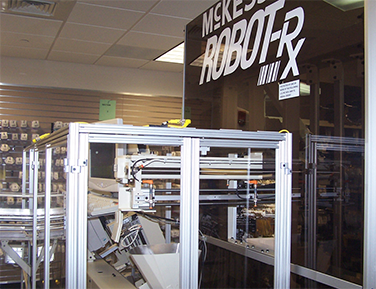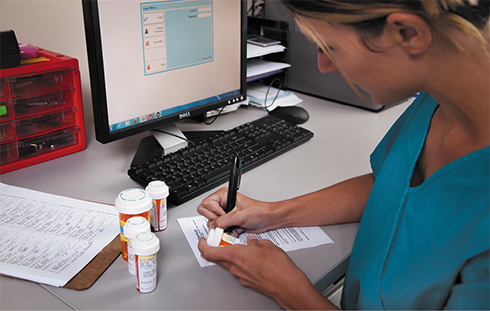16.4 Advancing Your Career
There will never be a time in your career in health care to coast and relax. Good career opportunities can arise unexpectedly, so make a habit of reviewing your career path and career goals regularly. Planning lends structure and substance to your career management. Many pharmacy technicians use their experiences as springboards into careers as pharmacists or nurses, or other related healthcare disciplines. As noted, there are chances to attain specialized training and certificates in sterile, hazardous, and nuclear compounding, among others. However there are other opportunities, many of which do not require new certifications but do require initiative.
Consider the decades of experiences Nicole Blades, CPhT, in Ann Arbor, Michigan, has had. She told the PTCB in a CPhT Spotlight interview: “I have 10 years retail experience, 7 years in an IV outsourcing facility, 2 years in a small hospital, 2 years in long-term care, and 14 years in compounding, non-sterile and sterile. I have been a trainer, inventory specialist, and lab manager.” Ms. Blades represents the career movement that can occur within the field.
The Effects of the ASHP Practice Advancement Initiative
Traditionally, less than 10% of technician time was spent in nontraditional or advanced roles, but these percentages are changing as pharmacists’ roles are expanding. With the multiplication of new drugs, drug interactions, drug studies of old drugs, and prescription drug abuse, doctors and physicians and other healthcare providers simply are not equipped with the time or resources to keep up with all this drug information as well as pharmacists are.
The ASHP is promoting its Practice Advancement Initiative (PAI) to help things change even more rapidly, but also consistently and effectively. The goal of the PAI is to advance the health and well-being of patients by supporting futuristic practice models that support the most effective use of pharmacy professionals in direct patient care. The PAI states that the desired healthcare team model “urges technicians to handle nontraditional and advanced responsibilities to allow pharmacists to take greater responsibility for direct patient care.”

Pharmacists are doing more and more direct patient care and medication counseling.
In the past, about 70% of pharmacy technician positions have been in community pharmacies, but these pharmacies are changing in nature with the rise of mail-order pharmacies and more tech-check-tech positions. Hospital pharmacy positions and clinical office positions are diversifying as well. Pharmacists are specializing more, which affects technician opportunities. Some home healthcare and community pharmacists choose to focus their practice on pain management for hospice patients or on oncology to treat cancer patients. Managed care pharmacists may select areas like anticoagulation control and cholesterol management for patients with high risk for heart disease. In the hospital, pharmacists are specializing in nutrition, pharmacokinetics, infectious disease, oncology, critical care, pediatrics, neonatology, and so on. This shift has led to groups of physicians opening their own pharmacies to accompany their practices, which opens up specialty areas for the technicians as well. Technicians who work with specializing pharmacists also become specialized in the same fields.
Advancement Opportunities
As technicians become more indispensable to the pharmacy team, there will be an increase in salary and benefits. The average salary in retail pharmacy is about $30K per year; in the hospital pharmacy it is slightly higher at $35K per year. Salaries depend highly on the state, region of the country, certification, and experience. Most technicians who assume supervisory or advanced roles are eligible for salaries in the range of $40K to $50K or more per year, again depending on experience and geographical location. To follow are some of the many advancement opportunities that exist.
Tech-Check-Tech and Dispensing Management Positions
In many high-volume institutional, community, and mail-order pharmacies, a hierarchy or “career ladder” of pharmacy technician jobs has evolved, especially in institutional settings. If certification is not yet required for an entry-level technician, then it is generally required for the higher levels. Corresponding job titles are Technician I and II or Entry-Level Technician and Technician Specialist or Senior Technician. The difference in responsibility (and reward) grows and expands as the technician moves up the department ladder and with the number of technicians that the individual handles with tech-check-tech. Research studies have demonstrated that a tech-check-tech system (that is, a senior technician checking another technician before the final pharmacist check) is likely to catch more errors than simply a pharmacist checking.

The tech-check-tech (TCT) system has demonstrated to be as or more accurate than a sole pharmacist check and has been approved by several state boards of pharmacy.
Strong leadership and management skills are necessary to be a successful senior technician. You may be involved in the interviewing and hiring of technician personnel, orientation and training of new employees, and performance review, as well as designing schedules and assigning workloads.
Controlled Substances Specialist
The controlled substance technician is responsible for ensuring facility compliance with all applicable laws, regulations, directives, policies, and procedures applying to the dispensing, storage, transfer, inventory, and accountability of controlled substances. This technician serves as the narcotic control and accountability agent for the department under the supervision of the pharmacist or the director of pharmacy. In this type of position, you would be responsible for maintaining all the necessary records for a perpetual inventory and for security of all narcotic and controlled drugs in the vault. Part of this responsibility is to perform random audits and resolve any discrepancies in inventory. You would also train new employees and update existing employees on all policies relating to controlled substances in the central or outpatient pharmacy and nursing units.
Pharmacy Benefits/Insurance Liaison
As was discussed in Chapter 8, in the retail pharmacy environment, it is important to have an experienced technician who is extremely knowledgeable about the nuances of insurance eligibility, verification, and claims processing. If a claim cannot be processed, the reason must be identified and resolved, and often the insurance liaison handles the cases the other technicians could not or did not have time to resolve, including situations requiring prior authorization (PA), charge-backs, or claims rejected in an audit. You may also be responsible for gathering information and submitting claims for medication therapy management services, which are less straightforward than the drug claims, as they may entail counseling and immunizations. As a technician, you could work from the other end, too, employed by the pharmacy benefit manager to work with pharmacies since you understand the intricacies of medications and dispensing.
In addition, as a payment specialist, you may handle or specialize in any medication assistance programs for patients of the community pharmacy or those preparing for discharge from the hospital. If the patient does not have drug insurance, you would provide the patient some options for ACA (Affordable Care Act) health insurance, visiting a community health center, seeking medication assistance online from the pharmaceutical manufacturer, or using available drug coupons. You may also advocate with the pharmacist or prescriber for a change to a lower-cost generic drug. Though this position is common in community pharmacies, medical billing departments have an emerging role in medication assistance advocacy as well.
 IN THE REAL WORLD
IN THE REAL WORLD
A pilot study at Wake Forest Baptist Medical Center revealed that there was only one error in 265,000 orders in a “tech-check-tech” system, which was a better safety record than without the system. The North Carolina Board of Pharmacy formally approved this role after reviewing the results of the pilot study. Similar results were demonstrated in Texas and Idaho with tech-checktech being used to check cart fills and floor stock refills. Now more than 19 states have approved or are allowing some form of this tech supervision. This role will increase the availability of pharmacist time to provide medication therapy management (MTM) services to provide better care and lower hospital costs.
Drug Distribution and Inventory Specialist
In community and institutional pharmacies, technicians can often move up the ladder of responsibility by gaining the position of manager of inventory. You may be responsible for preparing requests for proposals (RFPs) during the competitive drug bidding process for medications and intravenous solutions, and in some cases medical supplies. You would monitor stock par levels (the minimum amount of inventory needed on hand to meet known customer demand and a small surplus in case of unexpected demand) and oversee proactive ordering to ensure that neither shortages nor expensive overstocks occur.
This position is important to community pharmacies as they do not have enormous storage space or budgets for the high overhead costs of overstocking. In the hospital, this position is essential as well, because the cost of drugs and supplies generally is 60% to 70% of the total pharmacy operating costs. The budget must be continuously monitored as newer and more expensive drugs are prescribed or added to the drug formulary. The tech must assign minimum and maximum inventory levels that might need to be seasonally adjusted. The person in this position is responsible for checking any drug recalls, pulling these drugs from the shelf, as well as checking and returning any medications that are due to expire soon.
Medication Therapy Management Assistant
In the community pharmacy, pilot projects have utilized technicians to assist pharmacists in making telephone calls and gathering information on medication effectiveness and concerns from patients with diabetes, hypertension, asthma, chronic obstructive pulmonary disease (COPD), and heart failure (HF) in preparation for medication therapy management (MTM) counseling. This could be an area where you can specialize and then learn to process and submit MTM interventions from pharmacists for reimbursement. These targeted intervention programs (TIPs) are initiated by pharmacy benefit managers (PBMs) and are pharmacy- and patient-specific. TIPs include such cost-saving strategies as patient education on nonadherence to prescribed therapy, therapeutic duplications or potential drug interactions, under- and overdosing, and switching from nonformulary to formulary medications. As a specialist in this area, you could also be called upon to help monitor patient progress by checking in with the patients to track therapy adherence.
Pharmacists in the retail setting or clinics administer nearly every CDC-approved vaccine to patients upon request (influenza vaccine) or by written or verbal prescription to anyone over the age of 13 years (eligibility varies by state). You can focus on assistance by reminding patients about the importance of receiving vaccines, setting up and reminding patients about appointments, and helping them complete all the necessary forms (including the CDC-required VIS, or Vaccine Information Sheet). You can assemble all the supplies (vaccine, diluent, syringes, alcohol wipes, etc.) and draw up the vaccine (allowed in many states) for the pharmacist. You would also update the patient’s primary care clinician on the vaccinations for more effective record keeping.
To specialize in this area, you should get certification from the American Heart Association or American Red Cross in Basic Life Support/Cardiopulmonary Resuscitation (BLS/CPR). A certification as a phlebotomist (to draw blood) and various types of Occupational Safety and Health Administration (OSHA) certifications are helpful for specializing in immunization and blood testing medication therapy services.
In the future, with specialized training and certifications, technicians may be allowed to administer the vaccines and administer blood tests, especially during an emergency.

Though technicians can assist with vaccinations, they cannot administer them. But with appropriate training and certifications, they may be able to do so in the future.
Ambulatory Clinical Pharmacy Services Specialist
The pharmacist role has expanded to providing patient care services in ambulatory care clinics. In this role, pharmacists provide medication management for patients with chronic disease such as diabetes and hypertension. Pharmacy technicians are needed to assist in the ambulatory clinical pharmacy setting. Technicians serve as a point of contact for both patients and clinic staff. They also are able to increase efficiency of interactions between patients, pharmacists, and other clinic staff to help maximize the number of pharmacist appointments while minimizing communication errors. Additionally, ambulatory clinical pharmacy services technicians can help pharmacists by decreasing administrative responsibilities, allowing the pharmacist to dedicate more time to direct patient care.
Healthcare Device Patient Education Specialist
Patient counseling on prescription and OTC medications in most states may be offered only by the pharmacist. But there are no restrictions on technicians educating patients about how to monitor their disease and choose proper disease control devices. Such a role requires further preparation and home study. A motivated and experienced technician could consider focusing their efforts on learning about the available devices for treating common chronic conditions such as diabetes. With such information, you could help patients locate home aids for their drug therapy, trouble-shoot blood glucose monitoring equipment and instrument-specific test strips, and provide information about where to find no/low-sugar OTC products and diabetic skin care products in the store. You could also encourage patients to attend programs on diabetes education, including the advantages of various insulins and oral therapies.
In the future, with advanced training and certification, it is possible that pharmacy technicians may be allowed also to do limited counseling on OTC drugs and dietary supplements.

Specialists are needed who know the automated pharmacy equipment well enough to train others and maintain it.
Automation Specialist
As you have seen, automation plays an increasing role in both central pharmacy and nursing-unit drug distribution systems. The need exists for a pharmacy technician to oversee the operating system and keep technicians and pharmacists up to date on the automated technology. You may specialize in-house or gain special training and certification from the manufacturer on the automation systems your pharmacy or institution uses. You would then be in charge of troubleshooting and managing the systems you oversee, keeping the automation up to date and maintained, and training others in the use and maintenance of the equipment. You would research and make recommendations for the installation of new innovative technology.
Informatics Specialist
If you have an aptitude for working with computers, you may be assigned as a pharmacy informatics technician to work with the pharmacy software. Effective use and overseeing (and sometimes tailoring) of the interconnecting pharmacy software in either the retail or hospital setting are key to improving medication safety and health outcomes and lowering healthcare costs. In managing these software systems, you would be responsible for keeping up to date with the newest technology, handling updates and upgrades, virus and hacking prevention, and data backups. Training other pharmacy personnel in software use might also be your responsibility. You would compile and analyze various departmental data reports.
 Pharm Fact
Pharm Fact
Some studies indicate that, when hospital staff compile patient medication histories without a technician, one or more errors occur 15% of the time.
Hospital Admissions Medication History Specialist
During the hospital admissions process, it is important to determine all the medications and doses (including OTC drugs and dietary supplements) that a patient is taking, as well as drug allergies, prior to the admitting physician writing medication orders. Studies have found that medication histories are more accurately done by a pharmacy technician. As a medication history specialist, you would interview the patients, their guardians or those admitting them, their physicians, and others to collect crucial information about patients’ current drug and alcohol use and allergies. With knowledge of medications, you can help collect and verify the correct names and dosage levels. You would also do internet research through the medical records systems to collect any accessible information. In addition to your knowledge as a technician, you would be utilizing a great deal of communication and people skills.
 IN THE REAL WORLD
IN THE REAL WORLD
In a pilot study in a Wisconsin hospital emergency department, trained pharmacy technicians were put to work compiling patient medication and allergy histories. The trained technician conducted about 13 medication histories per day, and there were few errors and discrepancies. The pharmacist was still required to review the histories before placement in the medical chart. Prior to the study, the hospital admission team reviewed only 10% of the patients’ medication and allergy histories before the admitting physician wrote the medication orders. In the study, technicians reviewed 98%. The cost savings from reduced errors were estimated at greater than $100K per year, and the role of medication history specialist was officially implemented after the study’s completion.
Similar results were reported in a study from Connecticut. Over 25,000 emergency department reconciliations over a 12-month period of time demonstrated 96% accuracy when collected by the technicians and checked by a pharmacist. This change provided a 66% increase in accuracy over the previous process. In Florida, the accuracy of medication histories increased from 65% (from nurses) to 93% (with techs). Similar results were identified in hospitals in New Jersey, Maryland, California, and Utah.
Hospital Discharge Care Transition Specialist
This discharge specialist role includes easing the transition from acute care in the hospital to follow-up care in the community with the local pharmacy and primary care physician. Several pilot programs have demonstrated that an experienced pharmacy technician can facilitate the discharge prescription process. You would facilitate insurance verification and claims processing, identification and resolution of any prior authorizations, and referral to medication assistance programs if necessary. If the patient transfers to a rehabilitation center, long-term care center, hospice, or nursing home, you may help transition the medication information and discharge plans to the facility and to the relatives and caregivers.
 Pharm Fact
Pharm Fact
Over 80% of hospital stays involve drug therapy. The most prescribed drug types are to address pain; vertigo, nausea, and vomiting; dehydration, and mineral or electrolyte deprivation/imbalance. Many drugs need to be continued after discharge.
For certain high-risk patients on anticoagulants or transplant drugs, you would telephone and set up important follow-up visits with the laboratory or primary care physician or specialist in the community. If the patient needs a special injectable anticoagulant, you may call their community pharmacy to ensure that it is available in the inventory before discharge. During the exit interview with the patient, you would identify any discrepancies in the discharge prescriptions or patient education on the prescribed therapy, checking with the pharmacist or prescriber to address any problems. In one study, the percentage of readmissions to the hospital was reduced by 50% after this technician-based patient medication education program was implemented.
Hospital Pharmacy Satellite Pharmacy Managers
Some hospital pharmacies have elected to decentralize their pharmacies by creating smaller satellite pharmacies serving various wings or units. Common satellite pharmacy stations include pediatrics, neonatology, surgery, and the emergency department. Most satellite pharmacies provide both administrative drug distribution and clinical services. In this situation, a specialized technician can advance to become the manager of the satellite’s inventory and/or a key member of the clinical pharmacy team.
The specialized pharmacist and technician team in a satellite pharmacy can provide better quality and continuity of care and be more readily available to the hospital units’ physicians, surgeons, and nurses. The pharmacist rounds with the medical teams to better monitor drug therapy for side effects, adverse reactions, or drug interactions.

Having technicians compile hospital patient medication and allergy histories before the admitting physician writes the first medication orders greatly aids in accurate medication reconciliation and reduces medication errors.
As part of the unit team, you would serve as a liaison with the central pharmacy and the assigned clinical pharmacist and monitor floor stock inventory. You would become a specialist in the drug therapies prescribed in those units, such as birth and neonatal, heart, or oncology medications. You and the pharmacist may also be responsible for participating and assisting in any “codes” called on this hospital floor to provide stat (immediate, high-priority) medications. Checking the automated dispensing cabinets (ADCs)—such as Pyxis—on each nursing unit, optimizing and adjusting the drug inventory, monitoring for any drug diversion (especially controlled drugs), and troubleshooting any failures of the units’ ADCs would also be your responsibilities.
With a decentralized hospital pharmacy model, there is usually an improvement in the drug distribution system on the unit, a shorter turnaround time for stat medications, a reduction in missing doses from the unit dose cart, an improvement in nursing satisfaction, and an increase in time available for pharmacists to perform MTM services. The pharmacist would develop guidelines and protocols, and write medication orders following approved drug protocols, as well as teaching students and residents in both pharmacy and medicine.
Hospital Clinical Services Assistants
Expanded roles exist for pharmacy technicians in clinical services as well, including medication safety, patient education, immunization assistance, transitions of care, and medication therapy management services. These services have improved the quality of care provided to patients, especially in bridging therapies upon admission and discharge from the hospital.
Telepharmacy Technicians
Over 4,000 hospitals in the United States do not have 24-hour pharmacist services coverage, leading at times to problems for after-hours medication orders. Services can be provided around the clock when technicians remain to take night shifts, supported by on-call pharmacists. The off-site pharmacists can then provide services through FaceTime, Skype, and other wireless and internet audiovisual technology. These shifts or locations serviced by a remote pharmacist are called telepharmacies.
Alaska, North Dakota, Washington, California, Iowa, Montana, Texas, Vermont, Wisconsin, Utah, and other states and numerous naval bases are among the places that operate telepharmacies without a pharmacist physically present. These telepharmacies use state-of-the-art telecommunication and audiovisual software from multiple vendors to provide pharmacy services at a distance. Communications are via a HIPAA-privacy secured line. Pharmacists remotely enter and review all medication orders or prescriptions prior to technicians, nurses, and physicians dispensing or removing medications from floor stock or from an automated storage and distribution device.
Studies have demonstrated that telepharmacies provide patients with increased access to necessary medications, especially in rural hospitals and clinics, and that error rates do not increase with the use of telepharmacies. Software for telepharmacies has received the approval of both Centers for Medicare and Medicaid Services (CMS) and the Joint Commission. You can see an example of a telepharmacy services company, Telnet-Rx, at https://PharmPractice7e.ParadigmEducation.com/Telnetrx.

Pharmacy personnel may work inside a satellite unit. A technician could get direction from a pharmacist at a remote location.
Training to set up telepharmacies becomes essential in emergency preparedness—to be ready to deal with natural-disaster situations when traditional community and institutional pharmacy infrastructures have been harmed and pharmacists are unable to travel to the makeshift dispensing locations or are unavailable for mobile dispensing units.
Investigational Drugs Specialist
The experienced and certified pharmacy technician may also be involved in other expanded roles, depending on the size and location of the university or healthcare facility. The tech may be involved in investigational drug control in a large university and/or teaching hospital where several drug research studies are being conducted. Surveys have shown that some institutions allow technicians to perform a number of key tasks without direct pharmacist supervision, primarily in the areas of inventory management, communicating with clinical monitors (personnel that provide “on-site” monitoring of adherence to investigational drug studies), and auditing. Keeping track of each investigational drug administered to each patient is an important and necessary task for the technician. Many institutions have also reported technician involvement in teaching activities.
If you have experience as an investigational drug technician, you may be eligible for a position in the pharmaceutical industry working under the direction of a health professional or a scientist. Job responsibilities include supervising ongoing experiments, recording laboratory results, keeping records, testing for various compounds, and maintaining laboratory cleanliness. More responsibilities are typically given as the technician gains experience in laboratory techniques and proper research methodology.
Compounding and Infusion Specialist
With advanced practice certifications in sterile, hazardous, and/or nuclear pharmacy, technicians have the additional ability to specialize within these fields. They may hold positions in compounding facilities that specialize in neonatal and pediatric medications, oncology, gerontology, or parenteral nutrition for specialized cases, among other areas of focus. Within these facilities, technicians may also gain advancement in tech-check-tech, quality assurance, inventory, and automation.

Taking inventory and doing the record keeping for investigational drugs in university and teaching hospital drug research studies can be part of a new advanced role for the pharmacy technician.
Quality Assurance Specialist
Every retail pharmacy is required by the state board of pharmacy and CMS to have a quality assurance (QA) program to investigate and correct medication errors. The QA specialist oversees the implementation of improvement programs, error tracking and analysis, awareness building, and training. Hospitals and institutions also require such programs for Joint Commission accreditation. If a program does not exist, it may affect accreditation and reimbursement from government and private insurance.
Many pharmacies are reluctant to keep records on medication errors for fear of liability, but these records are exempt from legal requisition. The purpose of a QA program is not to penalize the pharmacist or the technician, but to identify the cause of the error and to implement policies to prevent a reoccurrence.
 Pharm Fact
Pharm Fact
Medication error records are exempt from legal action in order to encourage pharmacies to keep accurate records and analyze them.
A compounding pharmacy must also have a QA program that includes:
written procedures for verification, monitoring, and review of the adequacy of the compounding processes;
written standards for qualitative and quantitative integrity, potency, quality, and labeled strength analysis of compounded drug products;
written procedures for scheduled action in the event that a compounded drug is below minimum standards for integrity, potency, quality, or labeled strength. Such a program is required by law, especially after recent deaths from contaminated steroid injections by a compounding pharmacy in Massachusetts.
In hospitals, the manager of quality assurance must implement programs to improve departmental and employee performance and productivity as well as investigate relevant information on medication errors. Pharmacy technicians have also been utilized by drug information pharmacists to gather information on adverse drug interactions as well as medication errors; this information is then reviewed by the pharmacist before it is submitted to the Pharmacy and Therapeutics Committee.
A QA program may also include testing for aseptic technique and product sampling from the hospital’s IV cleanroom environment. As a quality assurance specialist, you would work closely with the cleanroom director to verify the stability, integrity, and safety of the medications compounded in the pharmacy.
Systematic Barriers to Technician Advancement
For the advanced practice roles for technicians to fully develop, the state boards of pharmacy have to advocate to their legislatures to write laws allowing these expanded roles. The National Association of Boards of Pharmacy has drafted language that each state board of pharmacy can use for a Pharmacy Practice Act that encourages the advancement of both the pharmacists and the technicians. The Model State Pharmacy Act and Model Rules of the National Association of Boards of Pharmacy (Model Act) can be accessed at https://PharmPractice7e.ParadigmEducation.com/ModelAct.
Currently, there are several barriers to accelerating these advanced roles for the pharmacy technician:
the lack of standardization in education and training programs
professional liability
concerns for patient safety and incidence of medication errors
regulations and restrictions by the state boards of pharmacy
pharmacist resistance to change as a threat to job security
lack of funding to support pilot projects to demonstrate the benefits of several of these advanced roles for technicians
Once the study results are completed, state boards of pharmacy have been receptive to allowing expanded technician roles in the Pharmacy Practice Act.